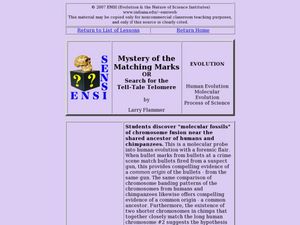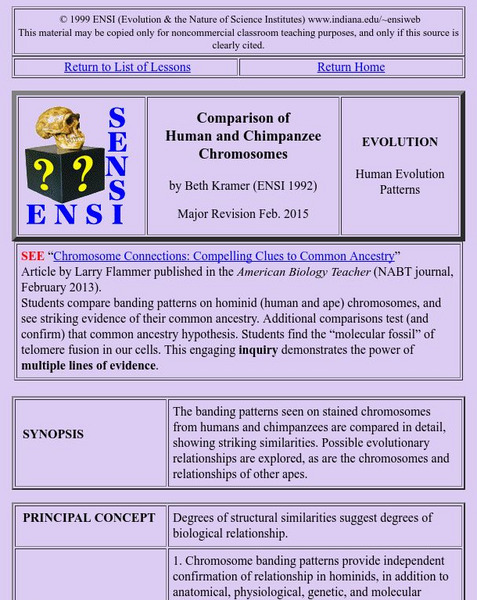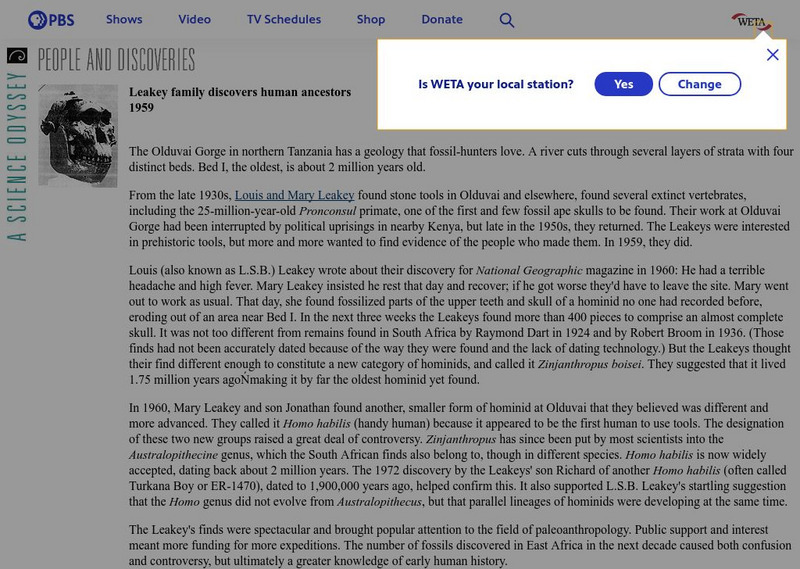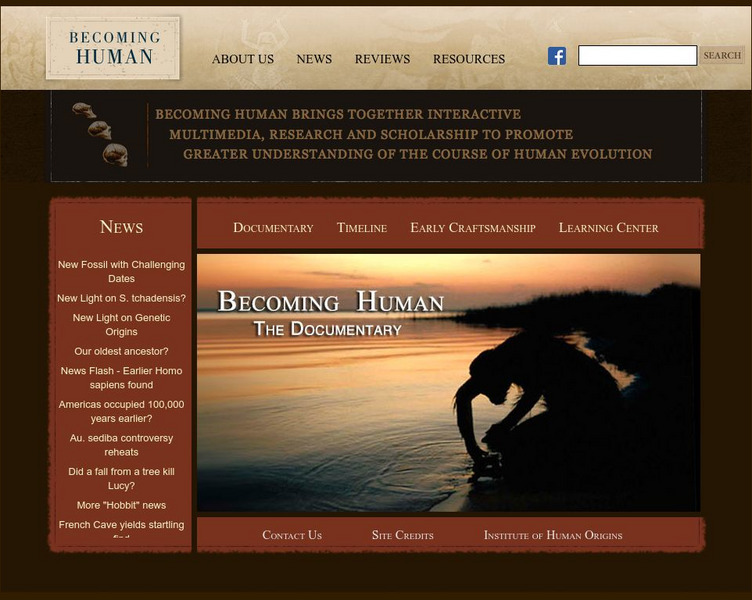Curated OER
Replacing Missing Links in the Evolutionary Chain
Examine the evolution of various species of hominids from their earliest existence approximately 4.5 million years ago to today. In small groups, learners research one of the ten stages of hominid evolution and then create a poster and...
Curated OER
Human Evolution: Biology, Bones
Learners will love a weeks worth of bone study. They use bones and characteristics of bones to explore the evolution of hominoids. Bones are compared, categorized, and considered. A great way to bring physical anthropology and material...
Curated OER
Warm Up: When Modern Human Behavior Appeared in Early Hominids
Upper graders or entry college level learners use the provided article links to answer three questions regarding early modern human behavior. They compose short essay responses that accommodate each part of the overarching question,...
Curated OER
The Earliest Humans
Study the wonder and science that leads us to our human past. From Darwin and Huxley's assertions regarding the origin of the species to the discoveries at Oldivi Gorge, this PowerPoint is sure to interest your class. They'll learn about...
Curated OER
Human Origins: The Prehistoric Human Race
When it comes to the origin of the human species high schoolers are full of misconceptions. Clear up the hominid confusion with this evolutionary activity focused on assisting students in understanding prehistoric man and his family...
Curated OER
Roots: The Ancestry of Modern People
High schoolers investigate the models for the origin of modern humans and the conditions that facilitate speciation and evolution. The classification and nomenclature of hominid species is also examined.
Curated OER
The Real Eve
Students research about human migration during a specific time period. In this physical science lesson, students watch a video about human evolution. They prepare a presentation on human migration and share it with the class.
Curated OER
Mystery of the Matching Marks
Students view a Power Point and complete activities related to genetic evidence of human evolution. In this molecular evolution lesson, students view and discuss a provide presentation. They search for the "tell-tale telomere" and...
Curated OER
Global Awareness
High schoolers read about how scientists are arriving at current theories of human origin and migration through mitochondrial DNA analysis. They then piece together a map showing the data from mitochondrial DNA analysis to plot the...
Curated OER
Hominid Series
Young scholars are introduced to the human stages of evolution. They complete a series of lessons on identifying the cranial structure for various hominids, understanding the timeline involved in human evolution and investigating ancient...
BBC
Bbc: Mother of Man Lucy
Article discusses the importance of Lucy to the theory of evolution and her bipedalism form of locomotion. Archived.
Indiana University
Ensi: Comparison of Human: Chimpanzee Chromosomes Lesson
This is a great lesson plan that combines Karoytypes and evolution. Students will recognize that the chromosomes of chimpanzees and humans are remarkably similar, then correlate that to their evolutionary relationship.
TED Talks
Ted: Ted Ed: If Superpowers Were Real: Immortality
In this series, educator Joy Lin tackles the superpower, immortality, and reveals just how scientifically realistic it is to be immortal. [4:30]
PBS
Pbs Learning Media: Life's Grand Design
Are nature's complex forms evidence of "intelligent design"? In this Evolution essay, biologist Kenneth Miller explains how the processes of evolution account for complex structures such as the human eye.
PBS
Pbs Learning Media: Laetoli Footprints
This Evolution video segment describes how the famous track fossils known as the Laetoli footprints might have been formed and what they can reveal about the creatures who left them.
PBS
Pbs Learning Media: The Transforming Leap, From Four Legs to Two
John Noble Wilford, a "New York Times" science writer, outlines various hypotheses on the origin of bipedalism.
TED Talks
Ted: Ted Ed: Let's Talk About Sex
In this video, John Bohannon and Black Label Movement mix talk and dance to implore honest communication between parents and their kids about sex. [10:43] Includes a brief quiz and a list of additional resources to explore.
TED Talks
Ted: Ted Ed: Nina Jablonski Breaks the Illusion of Skin Color
In this video, Nina Jablonski explains that human skin pigmentation is a product of the environment and evolution and explores skin's many different traits. [14:46] Includes a brief quiz and a list of additional resources to explore.
Science Education Resource Center at Carleton College
Serc: The Opposable Thumb as a Human Adaptation: Thumb Taping Lab
Young scholars conduct a short experiment to determine the importance of the opposable thumb by taping their thumb to render it useless while they proceed to do an everyday activity. In the end students will have the opportunity to...
Wikimedia
Wikipedia: Neanderthal
A detailed discussion of Neanderthals or Homo neanderthalensis. The article covers everything we know about them, for example, their discovery, their habitat, their genome, how they behaved, etc. Includes a timeline from when they were...
PBS
Pbs: Leakey Family Discovers Human Ancestors
The PBS site covers the Leakey family and their discoveries in Olduvai Gorge in Tanzania. This information was part of a PBS exploration of human evolution.
Other
Hooper Virtual Paleontological Museum
This site provides a virtual tour to the Hooper Virtual Paleontological Museum. There are many virtual exhibits to visit through a series of links, including Mass Extinctions and Human Evolution. Very descriptive and fun tour!
Other
Institute of Human Origins: Becoming Human
Multimedia-rich guide for anyone making their way through a study of human origin. Find information and analysis about the fossil record, comparative anatomy, theories, and the cultural adaptations of humans and their ancestors. With an...
Other
E Fossils: Step by Step: Evolution of Bipedalism
In this tutorial, students will identify the fossil evidence for the evolution of bipedalism then hypothesize about the evolutionary pressures affecting bipedal behavior.





















